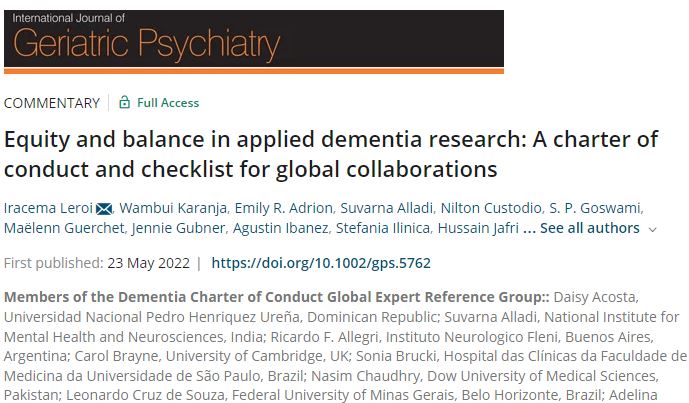22 de junio 2022
Introduction
With population ageing, the worldwide prevalence of dementia is increasing,1 particularly in low- and middle-income countries (LMIC), where over two-thirds of people with dementia reside.2 In many LMIC, health and social services for older people are scarce and the infrastructure to support people with dementia and their families is still developing. Likewise, capacity and capability for research related to non-communicable diseases (NCD), particularly dementia, is often limited.3 Barriers to developing dementia services and research are significant.4 The burden of home care is often placed on women, with direct and indirect personal, economic, and social impacts.5 Moreover, sociocultural and economic inequities, exaggerated by the COVID-19 pandemic, are important realities in LMIC.6
Dementia prevention and being able to ‘live well’ with dementia are imperatives that need to be addressed globally.7, 8 Due to the cost and availability of resources, when disease-modifying therapies for Alzheimer disease and other dementias become more widely available, accessibility for most people in LMIC will be limited. Thus, local solutions focused on prevention and supporting quality of life must increase. Moreover, biotechnology and medication production already available in some LMIC should be leveraged to foster this effort.
There have been increasing calls for dementia research funding to consider longer-term and more equitable approaches.9 Specific ‘roadmaps’ for LMIC are emerging, providing a principle-based steer to develop applied dementia research capacity and capability building, implementation science, and knowledge translation involving international partners.10, 11 However, achieving this is complex due to existing inequalities upon which these partnerships are often based.
The purpose of this article is to report on a series of transnational workshops and consultations with dementia-interested researchers and non-governmental organisations (NGOs) which explored how international collaborations for dementia research between LMIC and high-income countries (HIC) can be conducted equitably. The specific aim was to co-develop a Charter of Conduct to guide future clinical dementia research collaborations, ensuring advancement of the field for the betterment of people at risk of, or living with, dementia, and their families.


